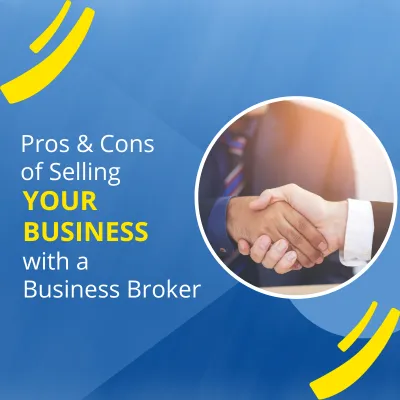How to Sell a Business Articles

Pros & Cons of Selling Your Business with a Business Broker
Pros and Cons of Selling Your Business with a Business Broker
You’ve decided to sell your business and are thinking of hiring a business broker.
Has the thought crossed your mind whether you can sell a business without a business broker?
This article tells highlights the pros and cons of selling a business with and without a business broker or M&A advisor.
Chapters
1. What is a business broker?
2. What do business brokers do for business owners?
3. Can you sell a business without a broker?
4. Pros and Cons of Selling a Business with and without a Broker
5. What is the Right Decision for You
What is a Business Broker?
A business broker is a professional who works in the mergers and acquisitions (M&A) industry. They can be known as business brokers, corporate advisors, or M&A advisors. I am an M&A advisor as I offer a wider range of services than a standard business broker. They interact with business buyers and sellers with the goal of an exchange of ownership, whether in part or full of a business.
There are different types of services they offer depending on who they represent. For the purposes of this article, we will talk about brokers who represent seller – sell side advisors. After all you are here as a seller.
Business brokers who represent sellers are tasked with 2 main goals:
1. Preparing a business for sale
2. Selling a business in part or full
Majority of the small business market brokers do not spend time on the preparation side, an oversight in my opinion, and work strictly on the sale of the business. There are many reasons for that, but it falls out of the scope of this article. Therefore, any interaction that you have with a broker if your business is doing less than £3,000,000 in revenue will centre around the technical aspects of selling your business and getting it to completion.
Brokers who work in the market above $3,000,000 will normally provide some preparatory services too. Preparatory work on a business has a very positive impact on a broker and seller’s ability to achieve a good sale price and also increases the chances of getting a sale to completion.
A word of warning, if any M&A professional does not spend time on preparing your business for sale is someone who is doing you a disservice.
What Do Business Brokers Do for Sellers?
A good business broker will take the time to understand your reasons for exiting the business and your goals for the sale. They uncover what your plans are post sale so they can form a plan for your sale.
Business brokers should offer a preparatory service to nurture your business toward a sale. Depending on what your timeline is they can build a roadmap to exit. This is a specialised service. In my experience it is the corporate advisors and M&A advisors who do this the best.
Business brokers will value your business. It is essential that businesses are valued correctly. Incorrect valuations are damaging to sellers in a multitude of ways. Whether it is unrealistic expectations or lost time, a good M&A advisor will get all the necessary information from you to ensure a fair valuation is made to ensure the best price for you and they best chance of selling.
Once your roadmap is in motion, they begin the work of marketing your business to prospective buyers. This begins the process of the sale your business. The sale has many elements, at least 11 to be precise, and the broker works with you to get your business to a successful exit.
Business brokers will advise you of the other professionals you may need to hire in the process depending on your particular business.
Ultimately, business brokers work for the seller taking into consideration your best interests.
Can You Sell a Business Without a Broker?
Selling a business without a broker is possible. In fact, about half of all business are sold without brokers. Businesses are sold to competitors, or via accountant and lawyers. Some are sold to employees. There are many ways that businesses exchange hands so selling your business without a broker is as common as selling with a broker.
In my experience businesses are sold without M&A advisors when a buyer is known to the seller already. If there is no clear buyer in sight, then that is when business owners typically turn to brokers.
If a business owner is confident in their business, in themselves and the business sales process, I see no problem in selling a business without a broker.
I would argue that any business that has a profit of less than £70,000, and you are an owner operator, you should sell the business yourself. The quality of broker that you can employ at the sub 500,000 in revenue range diminishes and business owners are usually left dealing with people who are not committed to get the best outcome for seller.
Pros and Cons of Selling with and without a Business Broker
There are many pros as well as cons that must be considered whether you choose to work with a broker or not. We’ll start with some of the pros.
Pros
Brokers operate in the M&A market.
If you want to work with someone who has got several businesses to completion, then working with a broker is for you. They know industry trends and can use that knowledge in the sale of your business.
They can already have a list of interested buyers.
This may not be relevant to you if you already have a buyer in mind. For those who do not have a buyer in sight business brokers can use their current contact to find someone for your business.
Professional valuations.
A broker will be able to value your business for you. They understand the market and multiples. This enables them to give you a correct valuation of your business.
They handle a lot of the tedious work for you.
If you are busy or just do not want to handle much of the sales process, then this is a great advantage. Business owners are busy running their businesses. Whether it is handling initial enquiries to vetting buyers to negotiation, brokers can handle much of the process for you.
A supporting hand throughout the process.
Although M&A advisors handle much of the process for you, it is your business, and you must do a lot of the work. If you do not know they process of selling a business, then having a third party advisor whose sole job to support your business sale is what you may be looking for. In most cases, they have been there before and can support you through the process.
Cons
Fees
I’ve put the fees as number one. The higher up the M&A ladder you go, the higher the fees. You can end up paying up to 15% of your total sales price to an advisor. For micro-businesses doing less than 500,000 in revenue the percentage is higher simply due to the disproportionate amount of work that goes into to selling a business of that size. Any good advisor who values their work has upfront fees, fees during the process/retainers and a success fee at the end.
Incorrect valuations
You may be thinking I’ve included valuations in the pros sections. Yes, some unethical brokers can either misvalue or overvalue your business. It is a bad practice. However, the reality is that many of the brokers, especially at the smaller end of the market, over value businesses. Then when a business has not sold for 2 years, you begin to question why. Many times it is because of this practice.
Loss of control of the sales process
Business owners have been in control of their business and professional lives. Using a broker to handle the process for you can be a con for some people. They will be involved with much of the preparation of your business for sale and communication and negotiation with buyers. Most sellers do not have an issue with this, but some do. Can you allow others to take control of your process?
Potential conflict of interest
I mentioned that brokers have a success fee. The biggest fee that we generate is at the completion of the sale. Some brokers will do anything they can to get a completion over the line, even if it is not the right thing for you, the owner. Luckily, this is not as common, at least with the people that I know, but it is not unheard of.
What is the right decision for you?
There is no right or wrong decision whether you choose to sell a business yourself or whether you choose to use a broker. There are however a few questions you should ask yourself.
Do you already know a committed buyer?
Is your business is prepared for sale?
Do you know the business sale process?
Is your business prepared for sale?
If the answer is yes to all or most of the questions, then selling your business yourself can be the right choice for you.
If the answer is no, then enlisting the help of an M&A professional can be a valuable asset.
Whatever you decide to do, I always advise sellers to get educated on the sales process, whether you are selling with a broker or without. Knowing the sales process enables you to take control of what is normally a very big decision and a valuable one. Going into the process with the correct now how helps you assess brokers and buyers alike.
Download the Checklist
If you want to find out more about how to sell your business without a broker.
Download the checklist below.
It is a step by step guide on how to sell your business the right way.
